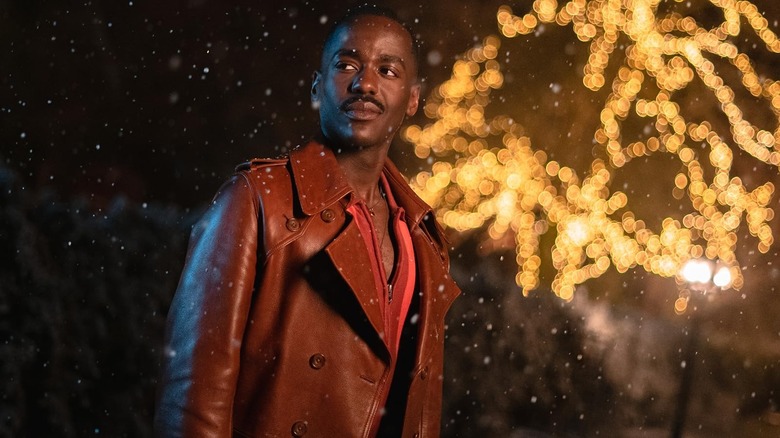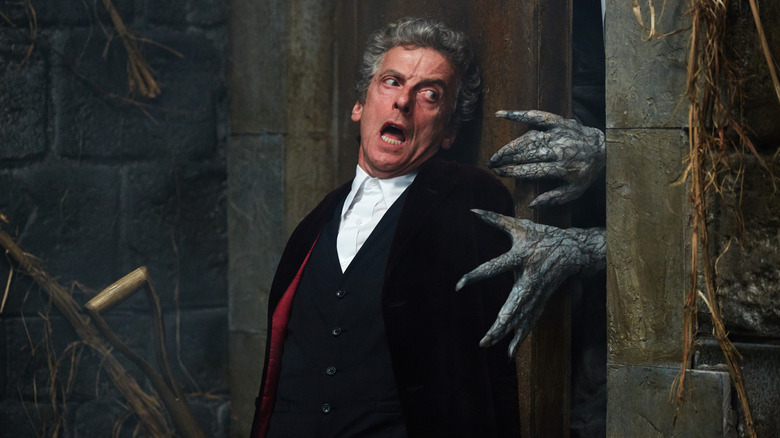Doctor Who's Best And Most Hated Writer Is Returning To The Show
When it comes to the modern version of "Doctor Who," Russell T Davies and Steven Moffat very much embody the idea that, as Harvey Dent famously argued in "The Dark Knight" (much to Christopher Nolan's confusion), "You either die a hero or you live long enough to see yourself become the villain." When Davies revived "Who" in the aughts, he brought along a skilled writing team that included Mark Gatiss and his future "Sherlock" and "Dracula" TV series co-creator Moffat. Together, the pair injected a refreshing dosage of horror in the "Who"-verse with their respective season 1 episodes, "The Uniquet Dead" and the two-parter "The Empty Child" and "The Doctor Dances" (the latter of which introduced queer icon Jack Harkness to the series).
So far so good, right?
By the time Davies had ended his initial run as head writer after four seasons and change, Moffat had delivered some of the best-received "Doctor Who" installments of all time. Indeed, with episodes like "The Girl in the Fireplace" (a better "Time Traveler's Wife"-esque story than Moffat's actual TV show adaptation), "Blink" (a terrific horror-themed standalone adventure pitting a baby Carey Mulligan against the Weeping Angels, which are now considered some of the show's all-time greatest baddies), and the two-parter "Silence in the Library" and "Forest of the Dead" (an equally scary and poignant introduction to the fan-favorite River Song) under his belt, Whovians were more than happy when Moffat assumed the helm during season 5. The feeling, sadly, was mostly gone when Chris Chibnall replaced Moffat after season 10.
It's worth bearing all of this in mind in light of the news Moffat is penning an episode for Ncuti Gatwa's Fifteenth Doctor in "Doctor Who" season 14, which also sees Davies returning as head writer. Suffice it to say, reactions will be mixed.
The Moffat conundrum
The "Doctor Who" website has confirmed Moffat is, in fact, coming back to the show, with Julie-Anne Robinson (a multi-award nominee for her work on "Bridgerton") directing his episode. As Moffat put it in his statement:
"Yes, okay, fair enough — apologies to everyone I've very slightly misled — I am in fact writing an episode of the series of 'Doctor Who.' Exactly like I said I never would. What can I tell you? There was begging, there was pleading but finally, Russell agreed to let me have another go — so long as I got out of his garden. Working with old friends and a brand new Doctor I couldn't be happier. Sorry, I was a bit reticent on the subject for so long. It was all part of an elaborate plan that would have delighted millions but at the last minute I forgot what it was."
So, why is Moffat both a hero and villain in people's eyes? Well, when he wrote for Davies, his episodes were narratively tight and struck the right mix of terror, whimsy, and pathos. When he took over as head writer, however, his worst habits became increasingly (and often painfully) obvious. His mystery box plotlines tended to end with a fizzle, the show struggled to balance different tones like his individual episodes did, and, much like Joss Whedon, it became clearer that Moffat is far more limited in his ability to write women than his earlier work suggested (to the point where some of his storytelling just came off as misogynistic). Even then, he could still churn out bangers like "Heaven Sent," which justly ranked second in our list of the best episodes of modern "Doctor Who."
People's problems with Moffat as a writer (mine included) extend well beyond his work on "Doctor Who," so I'll simply say this: the fact that he's not returning as head writer gives me hope he may yet end his run on "Who" on a higher note than he did in season 10. We'll see if that's the case when the new season premieres May 10, 2024, on Disney+ (or BBC iPlayer and BBC One if you live across the pond).

